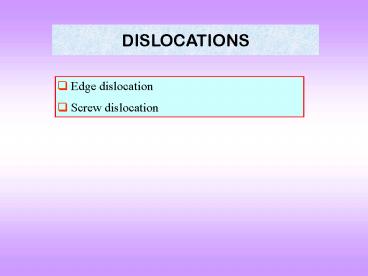DISLOCATIONS - PowerPoint PPT Presentation
1 / 33
Title: DISLOCATIONS
1
DISLOCATIONS
- Edge dislocation
- Screw dislocation
2
Plastic Deformation in Crystalline Materials
Creep Mechanisms
Slip(Dislocation motion)
Twinning
Phase Transformation
Grain boundary sliding
Vacancy diffusion
Dislocation climb
3
Plastic deformation of a crystal by shear
?m
Sinusoidal relationship
Realistic curve
4
As a first approximation thestress-displacement
curve can be written as
At small values of displacementHookes law
should apply
? For small values of x/b
Hence the maximum shearstress at which slip
should occur
If b a
5
- The shear modulus of metals is in the range 20
150 GPa
- The theoretical shear stress will be in the
range 3 30 GPa
- Actual shear stress is 0.5 10 MPa
- I.e. (Shear stress)theoretical gt 100 (Shear
stress)experimental !!!!
DISLOCATIONS
Dislocations weaken the crystal
6
Carpet
Pull
7
DISLOCATIONS
EDGE
MIXED
SCREW
DISLOCATIONS
Random
Structural
- Usually dislocations have a mixed character and
Edge and Screw dislocations are the ideal
extremes
8
Dislocation is a boundary between the slipped and
the unslipped parts of the crystal lying over a
slip plane
Slippedpartof thecrystal
Unslippedpartof thecrystal
9
A dislocation has associated with it two vectors
10
Burgers Vector
Edge dislocation
Crystal with edge dislocation
Perfect crystal
RHFS Right Hand Finish to Start convention
11
Edge dislocation
Direction of ?t vectordislocation line vector
Direction of ?b vector
12
- Dislocation is a boundary between the slipped
and the unslipped parts of the crystal lying
over a slip plane - The intersection of the extra half-plane of
atoms with the slip plane defines the
dislocation line (for an edge dislocation) - Direction and magnitude of slip is characterized
by the Burgers vector of the dislocation (A
dislocation is born with a Burgers vector) - The Burgers vector is determined by the Burgers
Circuit - Right hand screw (finish to start) convention is
used for determining the direction of the
Burgers vector - As the periodic force field of a crystal
requires that atoms must move from one
equilibrium position to another ? b must connect
one lattice position to another (for a full
dislocation) - Dislocations tend to have as small a Burgers
vector as possible
13
- The edge dislocation has compressive stress
field above and tensile stress field below the
slip plane - Dislocations are non-equilibrium defects and
would leave the crystal if given an opportunity
14
Compressive stress field
Tensile stress field
15
STRESS FIELD OF A EDGE DISLOCATION ?X FEM
SIMULATED CONTOURS
FILM
28 Å
SUBSTRATE
b
27 Å
(MPa)
(x y original grid size b/2 1.92 Å)
16
Positive edge dislocation
Negative edge dislocation
ATTRACTION
Can come together and cancelone another
REPULSION
17
Motion of dislocations On the slip plane
Conservative (Glide)
Motion of Edge dislocation
Motion of dislocation ? to the slip plane
Non-conservative(Climb)
- For edge dislocation as b ? t ? they define a
plane ? the slip plane - Climb involves addition or subtraction of a row
of atoms below the half plane - ? ve climb climb up ? removal of a plane of
atoms - ? ?ve climb climb down ? addition of a plane
of atoms
18
Edge Dislocation Glide
Shear stress
Surfacestep
19
Edge Climb
Positive climb Removal of a row of atoms
Negative climbAddition of a row of atoms
20
Screw dislocation
1
1 Bryan Baker chemed.chem.purdue.edu/genchem/
topicreview/bp/materials/defects3.html -
21
Screw dislocation cross-slip
Slip plane 2
?b
Slip plane 1
The dislocation is shown cross-slipping from the
blue plane to the green plane
22
- The dislocation line ends on ? The free surface
of the crystal ? Internal surface or
interface ? Closes on itself to form a loop ?
Ends in a node - A node is the intersection point of more than
two dislocations - The vectoral sum of the Burgers vectors of
dislocations meeting at a node 0
23
Geometric properties of dislocations
24
Mixed dislocations
?t
?b
?b
Pure Edge
Pure screw
25
Motion of a mixed dislocation
1
1 http//www.tf.uni-kiel.de/matwis/amat/def_en/k
ap_5/backbone/r5_1_2.html
26
Energy of dislocations
- Dislocations have distortion energy associated
with them - E per unit length
- Edge ? Compressive and tensile stress fields
Screw ? Shear strains
Elastic
E
Energy of dislocation
Non-elastic (Core)
E/10
Energy of a dislocation / unit length
G ? (?) shear modulus b ? b
27
?
Dislocations will have as small a b as possible
b ? Full lattice translation
Full
Dislocations(in terms of lattice translation)
b ? Fraction of lattice translation
Partial
28
Dissociation of dislocations
Consider the reaction 2b ? b b Change in
energy G(2b)2/2 ? 2G(b)2/2 G(b)2 ? The
reaction would be favorable
29
FCC
(111) Slip plane
B
A
b ½?1 1 0
?
b12 gt (b22 b32) ½ gt ?
30
Dislocations in Ionic crystals
- In ionic crystals if there is an extra
half-plane of atoms contained only atoms of one
type then the charge neutrality condition would
be violated ? unstable condition - Burgers vector has to be a full lattice
translation CsCl ? b lt100gt Cannot be
½lt111gt NaCl ? b ½ lt110gt Cannot be ½lt100gt - This makes Burgers vector large in ionic
crystals Cu ? b 2.55 Å NaCl ? b
3.95 Å
CsCl
31
Formation of dislocations (in the bulk of the
crystal)
- Due to accidents in crystal growth from the melt
- Mechanical deformation of the crystal
- Annealed crystal dislocation density (?) 108
1010 /m2 - Cold worked crystal ? 1012 1014 /m2
32
Burgers vectors of dislocations in cubic crystals
33
Slip systems
No clear choice? Wavy slip lines
Anisotropic































